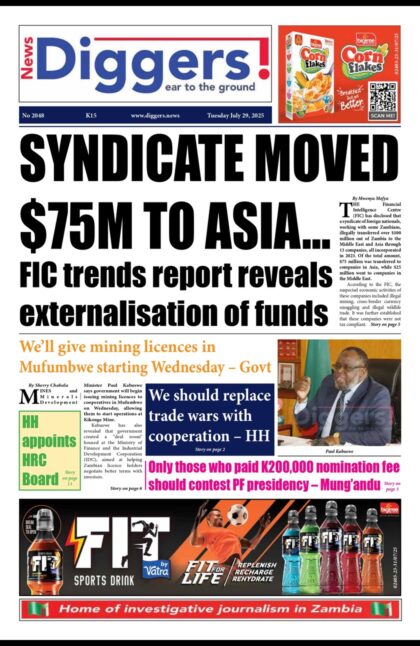THE International Monetary Fund should relax the criteria it uses to lend financial resources and instead yield favourable terms and conditions for Zambia to qualify for a bailout package because the country is in an economic crisis, says ZACCI president Chabuka Kawesha.
And Centre for Trade Policy and Development (CTPD) economist Dr Gabriel Pollen says the upcoming August 12 polls are not a determining factor in the ongoing bailout negotiations because all the IMF is concentrating on is fiscal management, debt contraction and sustainability.
On Thursday, a team from the Ministry of Finance concluded discussions with IMF staff following the end of a three-week Virtual Meeting and agreed to use Zambia’s recently published Economic Recovery Programme (ERP) as a foundation for a detailed policy reform agenda aimed at restoring public finance sustainability.
Commenting on the development, Dr Kawesha urged the Fund to relax the conditionality’s for Zambia to finally get on a Fund-backed Extended Credit Facility, which would help to shore up the country’s balance of payments support.
“ZACCI has expressed happiness and commends officials from the Ministry of Finance on regular updates in relation to the ongoing discussions with the IMF. We call upon the IMF and other cooperating partners to work and yield favourable terms and conditions to Zambia’s needs. The season and patch Zambia is facing is correctable and we are sure policy, finance and technical experts in the international arena do appreciate the urgency before our country, Zambia. I mean, they should also yield to some of GRZ’s requests. They understand the hardships the people of Zambia and the business community is going through. The bilateral or multilateral discussions are mutual. Give and take,” Dr Kawesha stated in a statement.
“As a country, we have a worrying situation over the country’s current debt level that is negatively impacting economic and social activities. And this requires collective information sharing, dialogue, consultations, give-and-take and feedback. The incorporation of the ERP, a short-term recovery programme that both the Zambia Chambers of Commerce and Industry (ZACCI) and Zambia Private Sector Alliance (ZPSA) have contributed to and participating in follow-up events. The captains of industry, led by the ZPSA Chairperson Dr Kawesha, recently met President Edgar C. Lungu to discuss the ERP and strategies towards scoring on some quick wins by the country. The discussions were reported as progressive by both government and the ZPSA. ZACCI is also calling upon all policy and monetary experts in the country to continue sharing advice and guidance on our recovery initiatives. It’s only through collective collaboration and knowledge sharing that can we ensure all economic sub-sectors flourish.”
And CTPD economist Dr Gabriel Pollen observed that the upcoming elections will not be a determining factor in the bailout negotiations.
“So, obviously, I have been in parts of CSO’s having conversations with the International Monetary Fund and what they have argued is that elections come and go and, therefore, elections do not frame negotiations that they have with countries. So, their argument is it (bailout package) might come before or after, so the election is not a deciding factor, that’s the picture that they are trying to send. So, they are not swayed by election outcomes or election contradictions; what they are concerned about mainly, they have been avoiding using this term, it’s the issues of ‘conditionality’s’ because those have a negative connotation. We know from the full-blown Structural Adjustment Programme (SAP) of 1990. So, what they have been saying is that, ‘there are a few things that the government has to put in order,’ and these are related to fiscal prudence and a comprehensive debt management plan. Essentially, what they are saying is that certain credit facilities just help the government carry our development programmes that have been encompassed by the leakages in the systems,” said Dr Pollen.
“It’s like putting water in a basket with an opening. So, my opinion is from the insights that I have gotten from the IMF and particularly related to the recent visit, I get the sense that the election is not a decider, the decider is the economic and fiscal climate and the debt position of the country because that’s what they are concerned about. Right now, we are living in unprecedented times, first it was COVID-19, and so there is a debt suspension initiative, for example. This gives a bit of leeway for the government to put itself in order. I’m not so sure if government has carried on with its appetite for debt contraction. All I can say is that the negotiations are placing a premium on fiscal management and reduced debt contraction, and the criteria that the IMF is demanding, where the premium is fiscal management and reduced debt contraction, is not anti-development.”



















